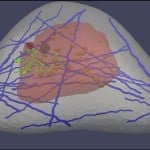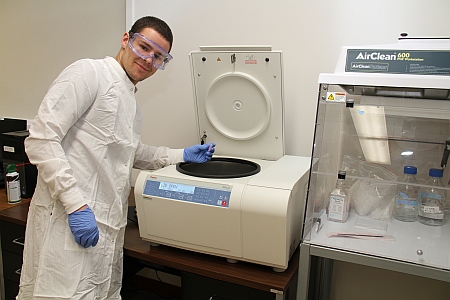 Next to lung cancer, breast cancer is the leading cause of cancer death in women, according to the American Cancer Society. That’s why so many medical professionals encourage women to get mammograms, even though the tests are imperfect at best: only a minority of suspicious mammograms actually leads to a cancer diagnosis.
Next to lung cancer, breast cancer is the leading cause of cancer death in women, according to the American Cancer Society. That’s why so many medical professionals encourage women to get mammograms, even though the tests are imperfect at best: only a minority of suspicious mammograms actually leads to a cancer diagnosis.
That results in lots of needless worry for women and their families—not to mention the time, discomfort and expense of additional tests, including ultrasounds and biopsies.
MORE
 Seminar presentation jointly sponsored by Michigan Technological University’s College of Engineering and the Departments of Biomedical Engineering and Electrical and Computer Engineering
Seminar presentation jointly sponsored by Michigan Technological University’s College of Engineering and the Departments of Biomedical Engineering and Electrical and Computer Engineering
Date: Monday, September 22, 2014; Time: 4:00-5:00 p.m.; Location: M&M U115
Title: Instrumenting the Human Body
Richard B. Brown, Ph.D., Dean of Engineering, University of Utah, Salt Lake City
 Feng Zhao, assistant professor of biomedical engineering, has been named an academic editor for PLOS ONE. PLOS ONE is the largest journal in the world, publishing well over 2000 articles per month. The underlying philosophy of PLOS ONE is that all research, if well-performed and well-reported, has something of value to offer the scientific community, and accordingly, PLOS ONE’s editorial criteria focuses on the technical quality of the work rather than any subjective judgments such as perceived novelty or limited relevance to a specialist field. Editorial Board members at PLOS ONE are given a high degree of editorial autonomy over the papers that they handle and are responsible for deciding whether a manuscript adheres to the journal’s criteria for publication.
Feng Zhao, assistant professor of biomedical engineering, has been named an academic editor for PLOS ONE. PLOS ONE is the largest journal in the world, publishing well over 2000 articles per month. The underlying philosophy of PLOS ONE is that all research, if well-performed and well-reported, has something of value to offer the scientific community, and accordingly, PLOS ONE’s editorial criteria focuses on the technical quality of the work rather than any subjective judgments such as perceived novelty or limited relevance to a specialist field. Editorial Board members at PLOS ONE are given a high degree of editorial autonomy over the papers that they handle and are responsible for deciding whether a manuscript adheres to the journal’s criteria for publication.
 Tolou Shokuhfar will be investigating the inner workings of a protein that plays a key role in human health with funding from a five-year, $400,000 Faculty Early Career Development (CAREER) Award.
Tolou Shokuhfar will be investigating the inner workings of a protein that plays a key role in human health with funding from a five-year, $400,000 Faculty Early Career Development (CAREER) Award.
Shokuhfar,a faculty member of both departments of biomedical engineering and mechanical engineering-engineering mechanics at Michigan Technological University, will study the biomolecule ferritin, which stores iron in the body in a non-toxic, mineralized form and releases it safely. In humans, ferritin serves as a buffer between iron deficiency and iron overload, and when it malfunctions, it may be involved in a number of degenerative diseases, such as Alzheimer’s and Parkinson’s.
MORE
See previous article: A graphene water balloon may soon open up new vistas for scientists seeking to understand health and disease at the most fundamental level.
It’s the Water: Graphene Balloon Yields Unprecedented Images of Hydrated Protein Molecules
The Department of Biomedical Engineering announces the recipients of the 2014 Kenneth L. Stevenson Research Fellows. Two undergraduate and two graduate students are selected annually to receive these competitive research fellowships. The Stevenson Fellows program provides an opportunity for upper-level undergraduate and early-stage graduate students to spend the summer in a total immersion research experience in a biomedical engineering research laboratory. The annual competition is open to students from all academic departments who wish to explore biomedical engineering research and provides a generous research stipend.
 Biomedical Engineering Graduate Seminar: Dr. Monica Hinds, Associate Professor, Department of Biomedical Engineering, Oregon Health & Science University; Friday, 4/18 at 3:00 in U113 M&M
Biomedical Engineering Graduate Seminar: Dr. Monica Hinds, Associate Professor, Department of Biomedical Engineering, Oregon Health & Science University; Friday, 4/18 at 3:00 in U113 M&M
Title: Endothelialization of Vascular Biomaterials
In developing blood-contacting vascular biomaterials, a confluent endothelial cell (EC) monolayer may be required to avoid adverse blood reactions. In vitro, the hemostatic properties (“thrombogenicity”) of ECs have typically been char-acterized using anticoagulated blood, static or non-physiologic flow conditions, and short blood exposure times. Con-sequently, the relevance of these findings for in vivo applications remains uncertain. Moreover, there have been few studies of the reactivity of EC constructs in vivo, and no studies have been reported that systematically relate the in vitro properties of endothelialized surfaces with their responses in vivo. Accordingly, it is now recognized within the tissue engineering community that a key impediment to further progress towards applications in man is the lack of predictive animal models that will enable the rational design of cellular constructs. We are characterizing the in vitro and ex vivo pro-hemostatic and anti-hemostatic properties of ECs (that can affect platelets and coagulation), and im-portant in vivo responses of thrombosis and vascular healing in a physically relevant primate model. Endothelial out-growth cells (EOCs), isolated from the circulating endothelial progenitor cells of baboons, have been seeded on pro-tein-coated ePTFE vascular grafts. We have studied the role of extracellular matrix coatings and hemodynamic pre-conditioning on the EOC phenotype, particularly related to coagulation and inflammation. Subsequently, in an ex vivo baboon shunt model, platelet and fibrin accumulation were measured under conditions of controlled, native blood flow. Finally, the endothelialized vascular grafts were implanted as aorto-iliac interposition grafts for 28 days. After a thorough evaluation of potential correlations, a linear regression model using in vitro data was established to predict platelet accumulation. This regression correlated significantly and strongly to both ex vivo platelet and in vivo intimal hyperplasia data. This is the first work of this type—attempting to determine predictors for vascular graft performance from in vitro endothelial markers, and while future work should examine the scope of the model by applying it to other endothelialized grafts, we are encouraged by these results, which may aid in improving translation of small diameter vascular grafts into clinical improvements.
This seminar is partially funded by the Visiting Women & Minority Lecturer/Scholar Series which is funded by the President’s Office and a grant to the Office of Institutional equity from the State of Michigan’s King-Chavez-Parks Initiative
Keegan Yates, a third-year biomedical engineering major, has been selected to participate in the National Science Foundation Research Experience for Undergraduates, to be held this summer at Virginia Tech.
He is among 10 students selected nationwide to participate in the program, which will focus on multiscale approaches to biomechanics.
Yates has been working on research projects in Assistant Professor Feng Zhao’s (Biomedical Engineering) Stem Cell and Tissue Engineering Laboratory since his freshman year. His major focus has been on the development and characterization of naturally derived biomaterials for tissue engineering. Dr. Zhao said “Keegan is a very smart, reliable, highly motivated and independent student who has good sense of science. Keegan has great potential to become an outstanding scientist.”
He has coauthored three papers and presented at the Biomedical Engineering Society national meeting in 2013, as well as twice at the Biotech Research Center’s student research forum, where he won a merit award in 2013 and a grand prize for best poster in 2014.
Yates will investigate mechanical properties of structures ranging from cellular component to the whole body and determine how this knowledge can help create devices to prevent, diagnose and treat injuries and disease.
The award includes a $4,000 stipend, lodging and transportation to Virginia Tech.

Biomedical Engineering Graduate Seminar:
Dr. Jan-Marten Seitz, Institut für Werkstoffkunde, Leibniz Universität Hannover, Garbsen, Germany
Friday, April 4 at 3:00 in U113 M&M
Title: “Development and Characterization of Magnesium-Neodymium Alloys for Biomedical Applications”
The aim of the presented study is to investigate and demonstrate the potential of neodymium additions as a substitute for rare earth (RE) misch-metal in magnesium alloys for biomedical applications. Here, the alloys LAE442, LANd442, ZEK100, ZNdK100, and Nd2 were manufactured and processed to evaluate their material characteristics in different states and to investigate the effects of Nd additions. To determine the mechanical characteristics of these alloys, tensile tests were initially carried out in the hot extruded state. Subsequent T5- and T6-heat treatments were con-ducted to reveal their effect on the alloys’ strength and elongation values. The general degradation behavior of the alloys in a 0.9% NaCl solution was investigated by means of polarization curves and hydrogen evolution. In addition, by using various in-vivo-parameters, a corrosion environ-ment was established to determine the alloys’ degradation in vitro. Comparing LAE442 and LANd442, a lack of corrosive stability could be ob-served while the mechanical strength remained constant in the latter alloy’s Nd substitution for the RE mischmetal. A contrary effect was deter-mined for the alloy ZEK100 compared with ZNdK100. In both substitutional approaches, heat treatment procedures could not align the substi-tutes’ material properties with the educts’ material properties. However, in the case of Nd2, which was initially chosen as relevant alloy to deter-mine the effects of Nd on Mg in a simple binary composition, excellent ductility and corrosion properties could be observed. This makes the alloy a promising candidate for use as resorbable implant material, especially in the field of stenting applications. Here, the enormous increase of duc-tility, promoted by an advantageous microstructural behavior under loadings, could be attributed to additions of Nd.
Biography: Within the past 5 years, Dr. Seitz has worked as a PhD Student and Scientist at Leibniz Universität in Hannover, Germany, with a focus on lightweight materials research and biomedical engineering applications. He developed process chains for resorbable Mg-implant applications such as stents, intramedullary nails, and sutures. This work included basic processes such as casting, hot-extrusion, heat treatment, drawing and coating procedures, as well as many analytical processes. The impact of different alloying elements on the mechanical and corrosive behavior of Mg in different conditions was one of the biggest challenges in this context. Besides the development of promising biodegradable Mg alloys, he also worked on the manufacture of thin wires from magnesium by means of extrusion and drawing processes. During an overseas stay at The University of Auckland, he developed polymer and ceramic based coatings for medical applications with magnesium and analyzed their structural behavior in a corrosive environment.
Graduate Research:
$300 Grand Prizes
Biotechnology Research Center
Connor McCarthy (Biomedical Engineering) for “Native Elastin Scaffolds as Blood Contacting Surfaces Incorporating Nitric Oxide Release,” Advisors: Megan Frost and Jeremy Goldman
Ecosystem Science Center
Adam Coble (SFRES) for “Both Height and Light Influence Leaf Morphology in Sugar Maple Canopy,” Advisor: Molly Cavaleri
$100 Merit Awards
Biotechnolgy Research Center
Yiping Mao (Biological Sciences) for “Overexpression of microRNA-30d increases insulin biosynthesis and protects against high-fat diet induced glucose intolerances,” Advisor Xiaoqing Tang
Mu Yang (Chemistry) for Reduction of Porcine Parvovirus Infectivity in the Presence of Protecting Osmolytes,” Advisor: Ashutosh Tiwari
Ecosystem Science Center
Cameron Goble (Biological Sciences for “Assessment of Fish Communities in Tributary Streams of the Big Manistee,” Advisor: Nancy Auer
Mickey Jarvi (SFRES) for “Sugar Maple Fine-Root Respiration is Mechanistically Constrained by Adenylate Control,” Advisor: Andrew Burton
Alida Mau (SFRES) for “Variation in photosynthetic temperature responses across vertical forest canopy gradients: Comparisons between temperate and tropical trees,” Advisor: Molly Cavaleri.
Justina Silva (US Forest Service) for “Assessment of Spatial and Temporal Sedge Mediated Oxygen Dynamics,” Advisor: Erik Lilleskov
Undergraduate Research:
$150 Grand Prizes
Biotechnology Research Center
Keegan Yates (Biomedical Engineering) for “Decellularization of Fibroblast Cell Sheets for Natural Extracellular Matrix Scaffold Preparation)”, Advisor: Feng Zhao
Ecosystem Science Center
Brittany VanderWall (SFRES) for “Leaf Mass Per Area of Sugar Maple (Acer saccharum) Varies Seasonally and Across a Vertical Gradient”, Advisor: Molly Cavaleri
$100 Undergrad Merit Award
Biotechnology Research Center
Michael Bostwick (Biomedical Engineering) for “Biomimetic Adhesive Containing Nanocomposite Hydrogels with Enhanced Mechanical Properties,” Advisor: Bruce Lee
